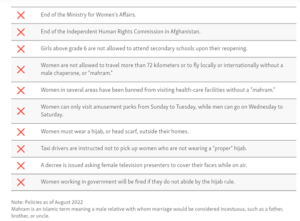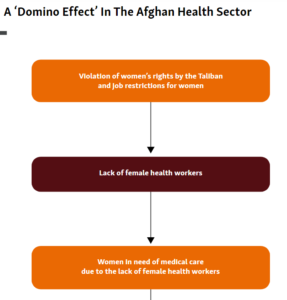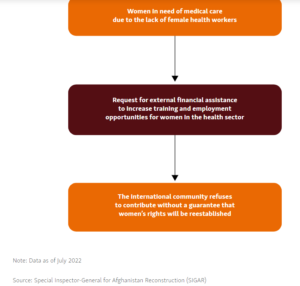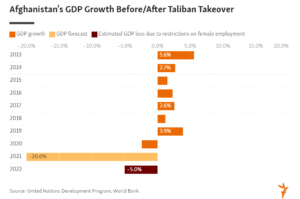
Image source: Sayed Muhammad Hussainy
By Claire Contri, Editor-In-Chief at The London Financial
August 2021 marked a dark day in the history of the Middle East: the return to power of the Taliban regime in Afghanistan, twenty years after their ouster by U.S. troops. A tragic situation for Afghans and especially Afghan women. Unfortunately, this situation has led to eradicating Afghan women’s fundamental rights to higher education and employment, effectively banning women from the public sphere, and causing a ‘domino effect’ that has wreaked havoc across the economy, notably the healthcare sector. A major humanitarian crisis has emerged. The international community deplores this situation, yet it merely watches these events unfolding. Perhaps the solution shall only be found within Afghanistan, led by the courage and conviction of Afghan women. Only time will tell.
Biden’s big mistake
Biden’s administration promised it: there would be “no circumstance when you’re going to see people being lifted off the roof of an embassy.” This referred to the “Saigon” episode when the chaotic withdrawal from Vietnam resulted in helicopters evacuating U.S. personnel from the embassy. He also declared: “The likelihood there’s going to be the Taliban overrunning everything and owning the whole country is highly unlikely.” Despite Biden’s promises, the reality happened differently than expected. In August 2021, helicopters were forced to evacuate people from the roof and a landing pad on the U.S. Embassy grounds in Kabul. In many videos taken by the local population, we can see Afghans and foreigners rushing to the Kabul airport, hoping to leave the country as the Taliban declared victory.
Expectations were overturned once again. For example, the New York Times reported that Biden’s intelligence briefings suggested it would be at least a year and a half before Kabul was threatened. The Washington Post, on the other hand, believed that Kabul could be overrun in six to 12 months. Sometime later, intelligence assessment shifted to within 90 days. Reality proved that within five days of that media report, the Taliban took over Kabul—a sad reality, but a reality, nonetheless.
Reality today
Reality today for Afghanistan is a sad one, unfortunately.
Since the Fall of Kabul on the 15th of August 2021, Afghanistan has been going in a downward spiral financially and morally.
After 20 years of military opposition, Afghanistan now faces an economy on the brink of collapse, threatening to worsen an already devastating humanitarian crisis. Now that all assets have been frozen, including from central banks, Afghanistan has been left utterly alone.
To make matters worse, international transfer companies such as Western Union and MoneyGram also suspended their services in Afghanistan, cutting off the supply of family money from abroad. The economy was already highly fragile and heavily dependent on external aid. A nation is considered aid-dependent when 10% or more of its gross domestic product (GDP) comes from foreign aid. In Afghanistan’s case, about 40% of its GDP was international aid, according to the World Bank.
Regarding GDP, Afghanistan’s GDP decreased from $20.14 billion in 2020 to $14.79 billion in only one year. What appears to be a substantial economic and financial crisis has exacerbated the existing food and humanitarian crises. According to the UN, “95 percent of Afghans are not getting enough to eat, with that number rising to almost 100 percent in female-headed households”, not to mention the collapse of public hospitals. Because of this, people needing care cannot rely on their own hospitals or international aid.
Similarly, acute hunger in the country rose from 14 million in July to 23 million in March 2022. As a response, Ramiz Alakbarov, Deputy Special Representative at the UN, calls for an “immediate, sustained, and large-scale humanitarian response.”
Furthermore, human rights, especially women’s rights, could not have been worse. Since the rise of the Taliban to power, their aim was apparent: restrict women’s freedom and rights as much as possible until they erase women from all public life. Hence, after more than two years after The Taliban takeover, a set of policies have been passed in order to reinforce control and oppression against Afghan women.
For example, here is an exhaustive list of human rights violations against women as of August 2022.

Image source: Radio Free Europe/Radio Liberty
The turning point was when the Taliban banned women from working in NGOs, stating that the female staff had broken dress codes by not wearing hijabs. This is a blow to many women’s rights as they are the primary earners in their households. It is also feared that Afghan women could be left unable to receive aid directly if organizations are only allowed to employ men, as the Taliban rules prevent men from working with women.
Moreover, the Taliban’s decision to ban women from attending university shocked the world. Right after the takeover of Afghanistan by the Taliban in August 2021, universities were forced to implement new rules, including gender-segregated classrooms and entrances. Women were only permitted to be taught by female professors or old men. But to make matters worse, they are now formally forbidden from pursuing higher education at all.
German Foreign Minister Annalena Baerbock said women in Afghanistan are experiencing “the biggest violation of women’s rights on Earth” and “may amount to gender persecution, a crime against humanity.”
Experts qualify the Taliban’s actions as tantamount to gender apartheid. By gender apartheid, Karima Bennoune, the Lewis M. Simes Professor of Law at the University of Michigan Law School, defined gender apartheid as “a system of governance, based on laws and/or policies, which imposes systematic segregation of women and men and may also systematically exclude women from public spaces and spheres.” She explains that “gender apartheid is anathema to [the] foundational norms of international law, every bit as much as racial apartheid was to the analogous principles prohibiting race discrimination. Ultimately, as racial apartheid was for Black South Africans, gender apartheid is an erasure of the humanity of women. Every aspect of female existence is controlled and scrutinized.”
Movements such as End Gender Apartheid have emerged as a desperate act of hope to raise awareness about the experiences of women in Iran and Afghanistan living under gender apartheid.
A ‘Domino Effect’ in the Afghan health sector and the Economy
The Afghan health sector was already in big trouble before The Taliban arrived. Now, it has gotten even worse. Because of the Taliban’s restrictions on female employment, they have had an apparent “domino effect,” pushing the healthcare system in Afghanistan to the brink of collapse. As illustrated below, the “domino effect” caused by the restrictions against Afghan women. This “domino effect” is a perfect example of how the Taliban are trying to erase women from any public sphere altogether.


Image source: Special Inspector-General for Afghanistan Reconstruction (SIGAR)
Moreover, the health sector has been damaged, and the economy as well, because of the same restrictions.
For instance, The United Nations Development Program (UNDP) estimates that, depending on the severity of the restrictions on the female workforce, there may be a drop of 5 percent in the country’s GDP, equivalent to up to $1 billion.

Image source: World Bank
According to UNICEF, the sharp decline in female employment has already resulted in a loss of at least $500 million for the Afghan economy in the last 12 months, translating into a 2.5 percent loss in Afghanistan’s annual GDP.
All that to say, the Taliban’s move to eradicate freedom from women is causing severe turmoil in the economy and healthcare sectors.
The international community: an absent fellow
“The world is watching us and doing nothing,” said an Afghan woman to the BBC regarding the international community’s role in Afghanistan.
Now that the Afghan economy has collapsed and people face food and water shortages, we could wonder what the international community is doing in a conflict in which they were deeply rooted.
The United States, which ended its two-decade presence in the country in 2021, froze Afghanistan’s assets and stopped all humanitarian aid after the Taliban captured Kabul. Despite repeated requests by the country’s rulers, there is no sign that the sanctions will be lifted. According to various experts, freezing Afghanistan’s assets is a mistake. On the contrary, the US “should first recognize the Taliban as Afghanistan’s rulers and then unfreeze bank assets. That way, it can hold the Taliban accountable,” he said, adding that if the US were to give financial concessions to the group without engaging with it, the money would end up in the Taliban’s coffers. Indeed, according to Deborah Lyons, the Secretary-General’s Special Representative and Head of the UN mission in Afghanistan, it is the only way to assist the Afghan people and help them through the economic and food crisis they are facing. Torek Farhadi, a former Afghan government adviser, adds on by saying that if money was to be sent to the Afghan market, the process must be audited by the UN to ensure it does not go into the hands of the Taliban.
On the other hand, in 2022, the UN made the “biggest-ever appeal” for humanitarian aid for a single country. According to their research, Afghanistan would need more than $5 billion to aid people inside and refugees outside the country. The UN has appealed $4.4 billion (€3.9 billion) for Afghanistan to prevent the “world’s most rapidly growing humanitarian crises” from deteriorating further. “This is the largest ever appeal for a single country for humanitarian assistance, and it is three times the amount needed and actually fund-raised in 2021,” UN aid chief Martin Griffiths told reporters in Geneva. The UN warned that if it failed to raise enough money in 2022, it must ask for $10 billion next year to tackle the crisis.
Moreover, countries like Denmark have agreed to grant asylum to women and girls from Afghanistan “solely based on their gender.” The reason for this decision? The “ongoing worsening conditions” for women and girls in Afghanistan. The Danish agency currently has five ongoing asylum cases with female Afghan nationals. According to Martin Lemberg-Pedersen, head of politics and documentation with Amnesty International Denmark, more countries should undertake the same initiative for the sake of Afghan women.
Despite these measures undertaken, most of the international community remains silent.
With the recent ban from the Taliban to authorize female NGO employees from going to work, at least half a dozen major foreign aid groups have said they are temporarily suspending their operations in Afghanistan. The reason is that most women work in these types of organizations. Hence, according to the aid organizations Save the Children, Norwegian Refugee Council, and CARE International, it is impossible to “effectively reach children, women and men in desperate need in Afghanistan without [their] female staff,” they agreed in a joint statement. Therefore, with female workers providing the most help in times of crisis, the impossibility for them to work has greatly worsened the situation regarding humanitarian help in Afghanistan. Now, even NGOs are limited in their exposure to people needing help. Amnesty International called for the ban to “be reversed immediately” and for the Taliban to “stop misusing their power.” A statement that has left the Taliban deaf to all further recommendations.
A revolution on its way?
Speaking of a revolution against the Taliban now would be premature.
However, despite occupation for almost two years, signs of Afghans challenging the regime have been witnessed worldwide.
These signs can take the form of conducting small resistance actions every day. That can start with posting content on social media, such as TikTok, or leaking videos to the world about the oppressive Taliban regime. Note that these hazardous and risky actions could cause the authors of the videos to be brutally tortured or killed. Nonetheless, hundreds are still being shared with the world.
Even more risky are the frequent protests that have happened all over Afghanistan since the Taliban took control. Indeed, protests against the Taliban started on 17 August 2021 following the Fall of Kabul, and they have not stopped since. For instance, on 19 August 2021, small protests consisting of women were reported in Kabul, demanding equal rights for women. For Afghans, the 19th of August is a special day: Afghan Independence Day, celebrating the Anglo-Afghan Treaty of 1919, granting Afghanistan its full autonomy from the British Empire. A key date in the history of Afghanistan that protesters took to heart in 2021 to show their discontent with the current regime. Again, going against the Taliban regime can mean risking your life. Many of the protesters have had to deal with the violence of the Taliban, which includes whipping, slapping, being beaten with electric batons, or being held captive in inhumane conditions. More recently, in December 2022, the day after the Taliban ban on women from attending university, thousands of women went to the streets to vouch for their rights. Here, it seems women are leading the movement to free themselves from oppression. Similarly to the Iranian slogan “Women, Life, Freedom,” Afghan women found their own slogan: “Bread, Work, Freedom,” which they constantly chant during protests for their rights.
As a result of the frequent and frequent protests, the Taliban Ministry of Justice has banned protests. The Taliban mentioned that protesters must get permission from the Ministry of Justice. The security services must be given information about the location and time of the protest and even the banners and slogans that will be used.
On another level, and similarly to what is happening in Iran, is the movement of men supporting women. More and more men are standing up against the brutal oppression women face. For instance, it is Professor Ismail Mashal’s case, who runs a private university in Kabul. According to him, women and men should have equal rights, especially regarding education. Professor Ismail Mashal risked his life for Afghan women as he went viral on social media after tearing up his academic records on television, saying there was no point in gaining an education in today’s Afghanistan. Despite the immense danger of his words, Professor Mashal will not stay silent: “The only power I have is my pen, even if they kill me, even if they tear me to pieces, I won’t stay silent now,” he says. Although he has received many threats since he went on TV, he hopes his advocacy will lead to a nationwide campaign. In the meantime, Afghan women across the country have continued to come onto the streets to demand their rights.
Furthermore, despite the ban on enabling women to attend university, Afghan women are shrewder than the Taliban think. Indeed, Afghan women are finding ways to continue their education as the Taliban continue to crack down on their rights. The Taliban’s interpretation of Islamic law has caused a wave of “underground education,” ranging from secret schools for girls within the country to women attending college secretly online. Thanks to international help, some women can continue their education secretly. For example, The University of the People, which works with thousands of refugees, reported in one week after the Taliban’s new ban that it received 2,208 applications. This is the highest level of interest from Afghan women since the Taliban took over. The school now has 2,000 Afghan women enrolled and 10,000 Afghan women who have applied. Another organization, Future Learn, a digital British education platform, announced it would provide Afghan women inside the country free access to all of its courses after the Taliban banned women from university. The risk of continuing education despite the Taliban’s rule puts extra anxiety on women, even within their homes, especially after the many attacks that have been taking place against their eagerness to learn and become independent.
Hope is the only way forward
Afghanistan, Iran, and Iraq, among others, have been subject to many controversies. Should these wars have happened? Was there any justification for such turmoil caused in the Middle East? Was it worth it after all? Should the West, and particularly the U.S., be trusted after that? Many questions remain unanswered. What is sure today, however, is that Afghanistan has been left out by those who promised to bring back order and the international community. Nowadays, the only hope for Afghans is to rely on themselves. Hence, I am afraid this article will not have a happy ending.
Nonetheless, it is still our choice and the Afghans’ to make it happen. In terms of crisis, hope is the only way forward. I can personally hope for Afghans to stick up for each other and remain united. The prospect of overthrowing the Taliban may be unrealistic, but revolutions and rebellions start with a thought. A thought that soon starts spreading and conquering people’s minds until it becomes their only reason for existence: an existence with the hope of peace and freedom. I have faith in the Afghans, as I have faith in those who are trying to help, despite them being hundreds of kilometers away. It is the case, for instance, of three courageous women: Sweeta Akbari, Annina Rautalahti, and Julia Niinistö, who co-founded Afghan Women Scholars, an association helping Afghan women get a scholarship in a university outside of Afghanistan.
Hope is sometimes the only thing that remains after all has been demolished. It is necessary for survival. Whether hope materializes in the form of a God, yourself, or others, we must keep believing in a better future. As one Afghan girl wrote in one of her letters addressed to the West: “The girls of this land, who are known for their bravery and thirst for education despite all the challenges, today are afraid, and their fear is not a fear of death; Rather their fear is a concern of the continuation of this dark and terrible period in which there is no hope.” That being said, let us get back to work, everyone. May hope guide you.
Claire is a French-American Senior at ESSEC Business School in France. She has already done several internships in finance and loves writing articles. She also has a strong interest in sustainable finance and firmly believes that business can be a force for good and lead to positive change. Claire also serves as the Editor-In-Chief of The London Financial. Last but not least, she enjoys meeting new people from different backgrounds and experiences the most!

Spot on with this write-up, I actually think this website needs far more consideration. I’ll in all probability be again to read much more, thanks for that info.
I am really loving the theme/design of your blog. Do you ever run into any browser compatibility problems? A handful of my blog readers have complained about my blog not operating correctly in Explorer but looks great in Opera. Do you have any solutions to help fix this problem?